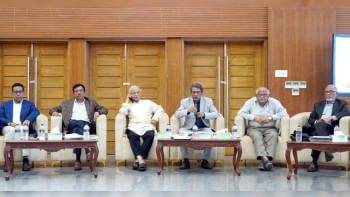The next generation

In 30 years, the sector grew to nearly 80 percent of exports. Now, aging RMG pioneers are handing over the businesses to their children
Nusrat Bari Asha, 30, keeps a picture of herself with her father on a small table behind her chair, opposite a vase of lilies, a source of inspiration in her day-to-day Dhaka-based business, even though he is still in his office, a few steps away.
The director of Benetex Industries Ltd, a Rupganj-based garment group, was planning the production of an order to a large American buyer Monday-- she did not want to reveal the unsigned contract's details -- in her meticulous office in the posh Baridhara's “DOHS” area. In between, she forcefully instructs mid-level officials on her visit to one of her seven factories later that day. And gives an interview.
"I have to do a lot of work at a time," Asha says, “because management style has changed a lot over the years. Now that the market is open, we have to compete a lot globally, which was not present during my father's time.”
After a textile marketing degree from the University of Philadelphia's college of textiles, Asha started her career as trainee merchandiser in her father's business group 10 years ago. Despite her rare level of training, being a young businesswoman in her father's firm has meant facing some challenges in being promoted above males many years older, and still does in the running of the business, she says.
"Acceptance of a female and of a fresh entrepreneur is difficult," she says. “Nobody wants to accept a woman and young entrepreneur.”
Asha and her team have to work until 9pm many nights to serve the global apparel buyers. They now focus more on fashion-forward designs and embroidered-accent garments to chase higher margins, because production costs are rising.
"As one of the decision-makers of the group, I have opened showrooms in Manhattan, New York, and plan to open another showroom in the EU," Asha says.
During her father's time, the industry thought only of production, not productivity. "But I think productivity must be the new survival mantra," she says.
The second-generation businessmen in the RMG sector is much more computer-savvy than earlier, she says: "I started three shifts in my company -- one shift for Hong Kong, another for Bangladesh and another for dealing in US affairs," Asha says.
"We need to balance between the old and new management styles, because we are more tech-driven now," she adds.
She says her business grew 14 percent in 2009, exporting $75 million. The number of workers under her is now 10,000.
Abdul Momin Mondol, managing director of Mondol Group, took the reins of his father's business in the middle of this year. He joined as a marketing and planning official 10 years ago. Sales in 2009 hit $105 million, with a growth of 15 percent.
A business graduate of East-West university, Mondol says there is a world of difference between the old and new generations' management styles.
"During my father's time, he used to execute the orders taken by buying house agents," he says. “The business style was different; now I try for direct communication with the buyers and I take the advantage of technologies.”
"Now I have to manage 26,000 workers in 21 units in my group," he says. He says he introduced new techniques and hired experts to reduce production costs and minimise waste because of intense global competition in apparel business.
He complains that the gas and power shortage has hampered growth. But he minimises his own challenges compared with those his father faced in establishing the company.
"Almost all systems have already been set up," he says. “As a result, we do not face major problem in management.”
Similarly, Shafiqul I Sarker Sohel joined his father's Purbani Group as a director 11 years ago, and brought a new business style.
"I have developed the corporate structure in my company," he says, adding he has been growing the business well, but margins are thinner than in his father's day.
Sohel, a UK business graduate with a postgraduate degree in economics from the US Pennsylvania University, says technology makes the management easier.
"In my father's prime, he struggled to manage 1,000 workers," he says. “Now I am managing more than 7,000 workers and other officials.”
Mostafa Quamrus Sobhan Rubel, managing director of Dragon Group, also joined his father's business in 2000 as a production and planning official.
"To me, management in a company is a teamwork,” says the head of one of the country's largest sweater companies. “I do not face any problem in managing such a large group, as I also respect other officials," he says.
He says he wants to grow the business through practicing efficient management. Rubel, a UK graduate of business studies at Nottingham Trent University who also has a US MBA, has been trying to reduce production costs to increase his profit margin.
His group exported apparel worth $48 million in 2009 and manages 10,000 workers. "I am trying to expand my business without a bank loan because the 15 percent interest rate takes away the profit," he says.
Rubel says the RMG export would cross $35 billion in next 10 years. Bangladesh's slice of the global apparel market is increasing, as China shifts to other sectors, he notes.

 For all latest news, follow The Daily Star's Google News channel.
For all latest news, follow The Daily Star's Google News channel. 



Comments